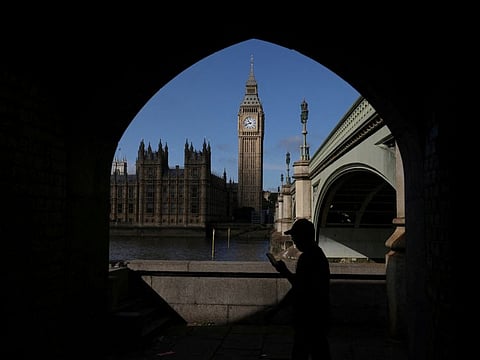UK economy headed for a rocky end of 2023 and risk of recession
This week’s data showed that the threat from inflation is in retreat

London: The UK economy is heading for a rocky final quarter of 2023 after a string of indicators this week prompted the Bank of England to halt its quickest monetary tightening in three decades.
Recession warnings are flashing, with a survey of purchasing managers pointing toward a contraction and potential jump in unemployment. The result prompted a quick shift in the policy debate away from fighting inflation and toward the risks buffeting the economy.
While this week’s data showed that the threat from inflation is in retreat, there were several concerns about a protracted downturn are rising up the agenda, complicating Prime Minister Rishi Sunak’s task of rallying Conservative Party members at its annual conference in little over a week in Manchester.
Here’s how the week unfolded:
PMIs
The loudest alarm sounded on Friday with S&P Global’s purchasing managers’ index slipping deeper into contraction territory in September. The research firm also warned that companies were shedding staff at the quickest pace since the pandemic and the global financial crisis more than a decade ago.
The BOE’s rate-setters were given an early sneak-peak of the gloomy data and pointed to it in their decision to call off another rate increase that was widely expected until last week. Central bank officials now expect gross domestic product to rise just 0.1 per cent in the third quarter, down from the 0.4 per cent growth they forecast just seven weeks ago.
Inflation
Inflation is falling more sharply than the BOE had anticipated, data released on Wednesday showed. The Consumer Prices Index eased to 6.7 per cent in August, well below the 7 per cent or more the BOE and economists had anticipated.
Bailey warned there’s “no room for complacency” on inflation, leaving the door open to restarting rate hikes. But the sense is that the UK has turned the corner on the worst bout of price increases in the Group of Seven nations.
That suggests the BOE’s bitter medicine of 14 back-to-back rate rises is beginning to work, as price pressures and the jobs market come off the boil, giving policy makers time to wait to see if inflation eases as quickly as they expect.
Retail sales
Retail sales data on Friday showed a 0.4 per cent gain in August, making up for part of the ground lost in July, when wet weather kept shoppers out of stores. As a result, retailers will contribute a net drag on third-quarter GDP, unless September’s reading shows an increase of 1.4 per cent or more.
Alex Kerr, economist at Capital Economics, warned that August’s growth was “not as good as it looks” and expects consumer spending to decline in the coming quarters.
While wages are finally rising faster than inflation, easing the tightest cost-of-living squeeze in generations, that may not be enough to overcome broader headwinds putting a chill on household budgets.
The value of retail sales in August was 17 per cent above pre-pandemic levels in February 2020, while the volume of those sales 1.5 per cent below - leaving people paying more to buy fewer goods.
For now, consumer confidence is improving. GfK’s measure of sentiment rose to its highest level in almost 2 years in September. However, Kerr cautioned that sentiment will likely be knocked back again by “the growing drag from higher interest rates.”
Public finances
There’s little prospect of fiscal support from Sunak’s government to prop up the economy during a tricky period, despite the continued outperformance of public finances data.
Chancellor of the Exchequer Jeremy Hunt poured cold water on the prospect of tax cuts, which members of the ruling Conservative Party want before the election. He said on Thursday that tax cuts are “virtually impossible” because of the challenging economic and fiscal backdrop.
House Prices
Britain’s property market is slowly deflating after a jump in mortgage rates strained the affordability of loans for home buyers.
Official data on Wednesday showed that average house prices were down slightly on November’s peak in July. Readings from mortgage lenders indicate the UK is about half way through a 10 per cent slump most economists are expecting.
That in itself could add to the chill winds buffeting the UK economy, making homeowners feel less wealthy and forcing those who are trying to get a rung on the property ladder to save more.
Sign up for the Daily Briefing
Get the latest news and updates straight to your inbox






